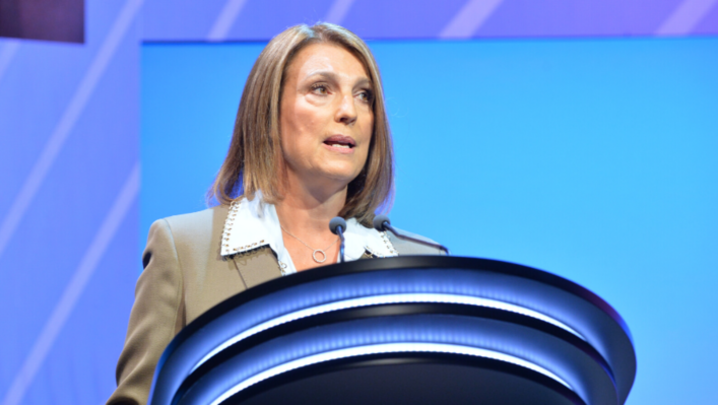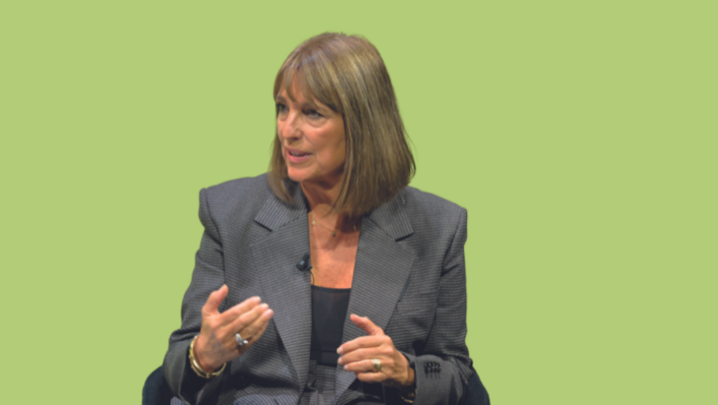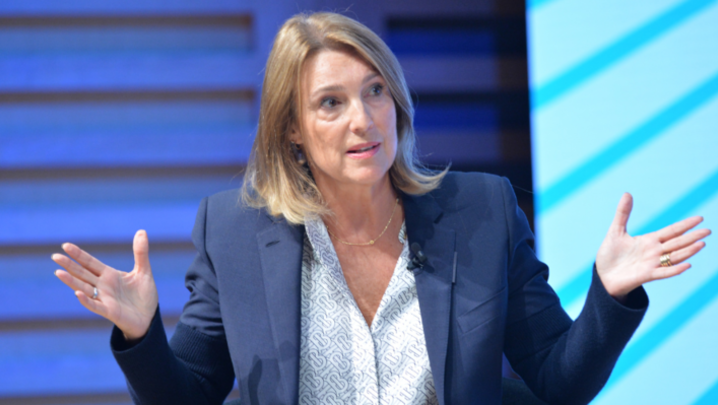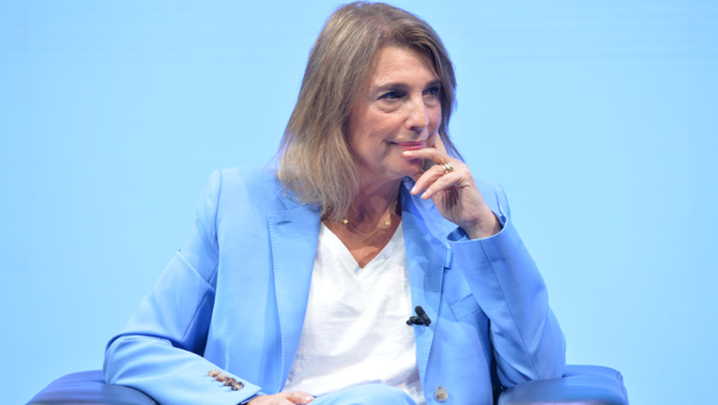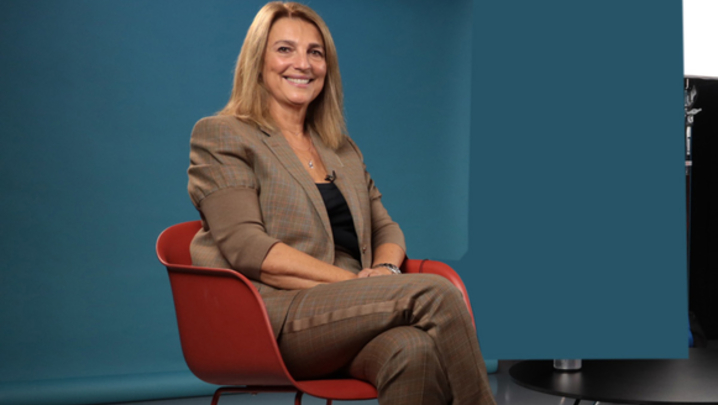ITV CEO Carolyn McCall guides Steve Clarke through her plans for RTS Cambridge
It may be Carolyn McCall’s first RTS Cambridge but she knows what she wants from the convention’s speakers. They should be positive and provocative. She also wants to hear from the voices of the people who consume the content.
“There is no point going into the Cambridge Convention with an attitude of ‘It’s all doom and gloom’. Yes, there are challenges but the opportunities for content creators have never been greater,” she emphasises.
“Netflix has its challenges, too,” she continues. “It has a huge amount of debt, a huge growth target. No one knows how it’s going to navigate that over the next five years.
“If you’re us, you’re transforming your company and reinventing what you do for a digital world, even though your channels still remain incredibly important.”
The ITV Chief Executive is speaking the day before she will announce ITV’s interim results – they turn out to be better than anticipated. It is one of the hottest days of the year. London feels like Lagos. Minutes earlier, Boris Johnson was announced as the Conservative Party’s new leader.
Neither of these headline-making events distracts ITV’s CEO as, with obvious enthusiasm, she describes her thinking behind the biennial convention and gives a taste of some of the sessions we can look forward to. McCall, who recently passed the 18-month mark running ITV, is chairing this year’s convention. She will be presiding over the three-day talking shop, “Content, consumers and everything in between”.
What she hails as an “explosion of content” is good for content creators and content owners, she reasons. It is also a win for consumers. They can watch their favourite shows when and where they choose to do so on their screen of choice. This, of course, has disrupted business models.
“Funding models for content are changing,” says McCall. “We need to reflect that at the conference… Different funding models often coexist in the same homes and in the same media companies.”
The ITV chief and her team have assembled a galaxy of media stars for Cambridge. But, before we get to them, she wants to talk about consumers – the audience, without whom anyone who works for a media company would be picking up their P45s.
“One of the things our research says is that consumers are overwhelmed by choice to the extent that they sometimes get paralysed and don’t know what to watch,” she says. “How do we, as players in the industry, navigate that? Debating that at Cambridge will be very interesting.”
To involve consumers directly in the convention’s discussions, the conference will feature a small group of viewers, the People’s Panel. They will provide a continuous reality check on proceedings via a live link.
“We want Cambridge to bring in the voice of the consumer,” insists McCall. “The panel is being produced by the brilliant Emma Gormley, who is in charge of all of our daytime shows. She wants it to be accessible, fast-paced and relevant. “If you want to talk about consumers it makes sense to have some real-life consumers in the room. We can do research that brings them in by proxy, but we wanted them to be there in the room with us.”
Based at ITV Studios in Leeds, Ranvir Singh, Good Morning Britain’s political presenter, will anchor the panel. Over the three days, delegates will get to know this group of people as their views are canvassed during some of the sessions. They have been selected to be representative across gender, age, ethnicity, and their religious and political views.
McCall wants “the convention, as a whole, to feel lively. We shouldn’t ever be far away from what consumers think. We want to avoid navel gazing – in other words, the industry talking to itself. The Leeds panel is there to ground Cambridge in reality.”
“One of the most important challenges we face is engaging consumers and attracting them to our content in preference to others,” explains McCall. “Because there is so much content, addressability and discoverability are probably two of the most essential things.
“We have to think about what personalisation really means and how many people really want it. Do they feel it’s intrusive? Is it done properly?”
Cambridge is renowned for attracting the media world’s big beasts – 2019 has them in abundance. The ITV CEO is particularly pleased that her Netflix counterpart, Reed Hastings, is attending: “I think one of the attractions for Reed in deciding to attend Cambridge was that he would be able to meet everyone in the same place. It’s fantastic that we got him.”
Alongside the leaders of the BBC, Channel 4 and Ofcom (in what will be Sharon White’s Cambridge swansong) speakers from outside the UK include Discovery CEO David Zaslav, who is a convention veteran, and Linda Yaccarino, head of advertising sales and client partnerships at NBCUniversal. She will provide the curtain raiser to a session on advertising chaired by the Financial Times’s John Gapper who coined the phrase “Mad Men to Math Men”.
Last summer, he asked, provocatively, if today’s obsession with data would eventually extinguish the kind of freewheeling, Madison Avenue-style creativity personified by the stylish Don Draper. Gapper’s panel features: Nils Leonard, founder of creative studio Uncommon and Philippa Brown, global CEO of media buying agency PHD Worldwide.
Another Cambridge star speaker is Sir Lenny Henry, a consistent and vocal campaigner for greater diversity in the TV sector. He will be joined at the convention by Group M’s CEO, Karen Blackett.
“I first met Lenny about 15 months ago, very early on in my time at ITV. Karen is someone I’ve known for a long time. She knows Lenny well and does a lot of work with him in diversity,” says McCall. “He really wants to talk about this and to challenge people’s perception of what it’s like, even when you’re famous, to actually cut through in production.”
As well as diversity, Cambridge will also – in a break with precedent – have a panel devoted to discussing unscripted content. Stephen Lambert, the man behind Gogglebox, The Secret Millionaire and Undercover Boss, Channel 4 CEO Alex Mahon and RTS conference stalwart Tim Hincks are all booked for what is bound to be a standout session.
With several big players preparing to launch their own SVoD services – not least ITV, whose collaboration with the BBC, BritBox, is imminent – the vexed question of rights ownership has emerged as a key issue for broadcasters and streamers alike.
“IP is more important than it has ever been,” says McCall, who, alongside BBC Director-General Tony Hall, laid out the launch plans for BritBox in July. For £5.99 a month, the platform will offer a service described by Hall as “truly British, showcasing our culture and telling distinctive British stories”.
“There is definitely a gap in the SVoD market for British originated content,” says McCall. “All of the services have a sprinkling of it but, over the next couple of years, that will all be coming back to BritBox.
“It will be the place where you get multi-series box sets that are British originated. When I say multi-series, that is the most important thing. There won’t be just one series of a show.”
She adds: “BritBox is not trying to do what Disney or Apple will do, or what Netflix and Amazon do, it’s a completely different service.
“The valid question, of course, is how many of these subscriptions can any one family take? What is clear from the research is that people are open to having multiple subscriptions, so long as they are good value and provide what they want.”
Would she ever put Love Island exclusively on BritBox? “Not today, but who knows? I don’t know the answer to that because I don’t know what is going to change in the next three years. Look what’s changed in the past three years.
“What I will say today is that you’ll be able to see all the back series of Love Island on BritBox. Today, you won’t see the current series live as it’s running on ITV2. But everything is evolving.”
Brexit misery for advertising
Carolyn McCall: ‘Prolonged uncertainty over Brexit has had a negative impact this year on advertising. It makes life much more difficult because you don’t really know when that economic uncertainly will be finished. Dealing with the volatility this brings has been the hardest bit.’
Why PSB is still essential
Carolyn McCall: ‘I think public service broadcasting is more important than it has ever been. If you don’t have trusted, accurate sources, not just for news, but wider than that, in current affairs and content, then you are on a slippery slope.
‘It’s very important for British society to have PSB. What is anachronistic are some of the uneven rules. Online is still a bit like the Wild West while TV is the most regulated medium in the world.
‘I’m not necessarily asking for less regulation, I’m just saying it’s uneven. We need a modern-day broadcasting act because the last one was in 2003. Think what’s changed in those 15 years.’
Nailing the BritBox deal
Carolyn McCall: ‘It’s not an easy thing to do to get large organisations who are in the same market to agree on something. It’s complex and difficult, which is probably why it hasn’t happened before.…
‘A lot of people talk about collaboration and co-operation but they don’t really mean it. Often it’s just a deal.
‘Increasingly, you have to choose those people you really want to collaborate and partner with, and do it at a much deeper level than you’ve done before. BritBox is a very good example of that.’
What she’s watching
Love Island (with her three teenage children): ‘I haven’t missed an episode. I am watching it either live or on catch-up. It’s brilliant entertainment.’
Killing Eve, Big Little Lies
Summer sport – particularly horse racing


